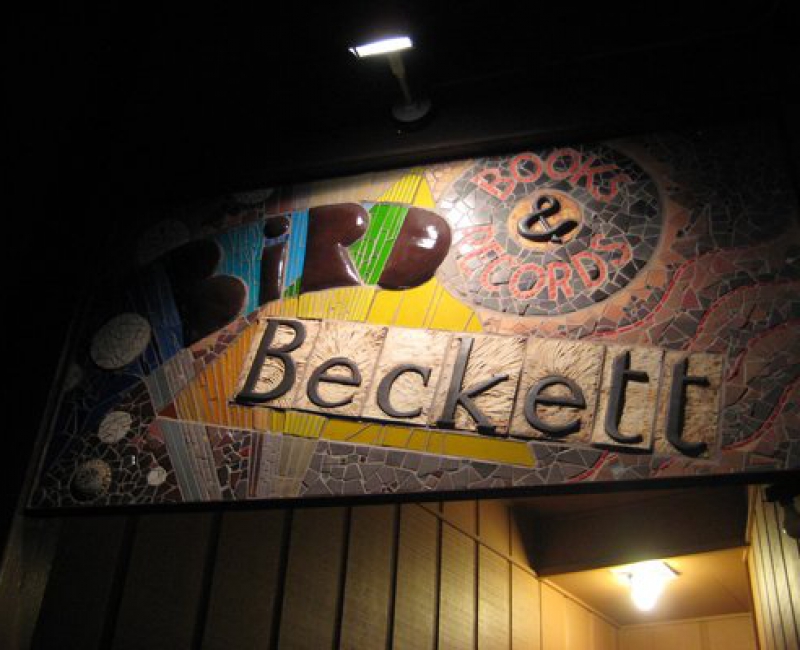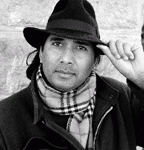653 Chenery Street
in San Francisco's Glen Park neighborhood
1-415-586-3733
[email protected]
Open to walk-in trade and browsing
Tuesday to Sunday
noon to six
Live Streams every weekend!
Refresh your browser to catch a show in progress!
Visit our Facebook page or YouTube channel!
But nothing beats being in the room with the music & the musicians!
Sukhawat Ali Khan is a singer and harmonium player expert in Qawwali (sufi devotional music) as well as the Pakistani/North Indian classical music of the Sham Chaurasi gharana. He is also a strong proponent of a modern, energized world music fusion that merges the danceable club sounds of many global cultural capitals. Truly, his sensibility embodies some of what we intended in calling our concert series “which way west?” and we’re proud to have presented him several times on the Bird & Beckett stage over the years.
Sukhawat was attracted to music at an early age and began studying the harmonium at seven. At ten, he and his brother Shafqat Ali Khan were singing on a local radio station in Lahore, Pakistan, beginning a career that found him performing internationally. Eventually, he settled in the San Francisco Bay area, where he began to teach Indian classical music. In 1998, he teamed with his sister, Riffat Salamat, and her husband, Richard Michos, in the Ali Khan Band, which released two albums, Taswir and Zindagi, then changed its name to Shabaz and released an album, named Shabaz. In July 2007, Sukhawat Ali Khan’s debut solo album, Shukriya, was released in the U.S.
Together with many talented cousins and siblings (including his sister, Riffat Sultana, well known to Bay Area audiences), Sukhawat carries on an unbroken 600-year family musical tradition known as the Sham Chaurasi gharana.
The Sham Chaurasi gharana is a gharana (house of musical heritage) in Hindustani classical music and Pakistani classical music founded by Sukhawat’s ancestors that is known particularly for the singing of vocal duets. Â Its most notable modern proponents from 1945 until the early 1970s were the brothers Salamat and Nazakat Ali Khan, Sukhawat’s father and uncle, respectively. The gharana is centered at a village of the same name in the Hoshiarpur district of Punjab (India).
The Sham Chaurasi gharana is believed to have been founded in the 16th century by Mian Chand Khan and Mian Suraj Khan, who were contemporaries of Mian Tansen at the court of Mughal emperor Akbar. According to one legend, the founders were given a parcel of land here as a grant to them by Mughal Emperor Akbar. In an alternative version of the origin, the Mughal Emperor Muhammad Shah Rangila was said to have been so impressed by the gharana that he gave all income from the 84 local villages, known as ‘Chaurasi’, to the Sufi saint Sant Shami Shah. This is where the name Sham Chaurasi comes from.
Successive generations of musicians in the Sham Chaurasi gharana specialised in the dhrupad form of singing and evolved a tradition of duet vocal jugalbandi performances. Meer Baksh and Khairdeen, Vilayat Ali and Hadayat Khan, Nazakat Ali and Salamat Ali are noted practitioners of jugalbandi from this gharana. Â Mian Karim Bukhsh Majzoob, Ustad Ahmed Ali Khan, Ustad Niaz Hussain Shami, and Ustad Vilayat Ali Khan were some of the illustrious members of the Sham Chaurasi gharana. As noted, the most notable modern performers of Sham Chaurasi jugalandi duet singing from 1945 until the early 1970s were the brothers Salamat and Nazakat Ali Khan, Sukhawat’s father and uncle, respectively.
 Regarding the advent of Sukhawat’s father and uncle on the world stage, their career and their legacy:
Regarding the advent of Sukhawat’s father and uncle on the world stage, their career and their legacy:
Sukhawat’s musical lineage comes directly from his father, Ustad Salamat Ali Khan, and uncle, Nazakat Ali Khan, who shared a distinguished career as the Ali Brothers. An obituary of Sukhawat’s father, Salamat Ali Khan, can be read at this link and gives a brief introduction with regard to the musical tradition and family heritage that Sukhawat carries on.
It is said that some of the most memorable Hindustani/Pakistani classical music of modern times was sung by the brothers Salamat and Nazakat Ali Khan. Salamat showed an early genius for music, and their debut performance was on All India Radio, Delhi in 1942, when Salamat was only 8. At the age of 11, the brothers traveled to Amritsar for a memorable concert that was reviewed in the press, with this to say:
“When the performance started, it seemed like a feast of musical notes had descended upon us in the audience. Every member of the audience was amazed and in complete awe of the duo. It was almost unbelievable that boys of that age could give such a fine performance. When the drut portion started, the brothers gave a blazing display of taans, sargams and layakari, which left the audience stunned”.
After the 1947 Partition of British India, the family first moved to Multan, Pakistan and later moved to Lahore, Pakistan. They emerged as leading performers of classical music in Pakistan. Hameed Naseem of Radio Pakistan once remarked about Nazakat and Salamat Ali Khan: “Tansen issi tarah gata ho ga!” (“the legendary Tansen must have sung like this”).
A number of their recordings exist from their very fruitful partnership until 1974. Subsequently, due to differences over finances, they broke up, and Nazakat Ali Khan was to die in 1984, but Salamat Ali Khan continued singing along with his sons Sharafat Ali Khan and Shafqat Ali Khan, and grandson Shujat Ali Khan until his death in 2001. His sons, grandson and daughter continue the Sham Chaurasi tradition to this day. Ustad Salamat Ali Khan’s second eldest son, Ustad Latafat Ali Khan is one of the finest exponents of the Ghazal, Thumri & Kafi singing as well as Pakistani classical singing in the UK. His son Sukhawat and daughter Riffat Salamat (now known as Riffat Sultana) both reside in the Bay Area and perform frequently for local and international audiences, individually and together in larger ensembles.
TAKE OUR SURVEY
To take our SURVEY, click here, and help the BBCLP get to know you better! As Duke Ellington always said, we love you madly...
The Bird & Beckett Cultural Legacy Project

Our events are put on under the umbrella of the nonprofit Bird & Beckett Cultural Legacy Project (the "BBCLP"). That's how we fund our ambitious schedule of 300 or so concerts and literary events every year.
The BBCLP is a 501(c)(3) non-profit...
[Read More ]
The Independent Musicians Alliance
Gigging musicians! You have nothing to lose but your lack of a collective voice to achieve fair wages for your work!
The IMA can be a conduit for you, if you join in to make it work.
https://www.independentmusiciansalliance.org/
Read more here - Andy Gilbert's Feb 25 article about the IMA from KQED's site





